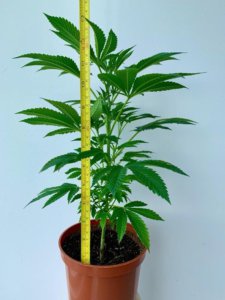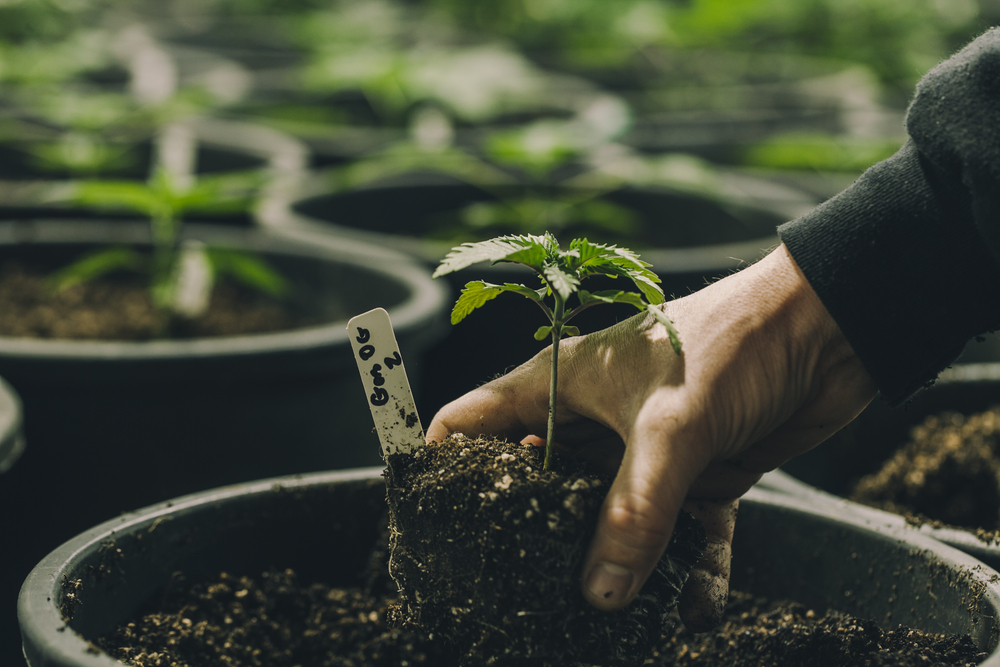by Ryan Douglas, Ryan Douglas Cultivation, LLC
Cultivation businesses should consider specializing in just one stage of the cannabis cultivation process. The industry has focused heavily on vertical integration, and some regulating bodies require licensees to control the entire cannabis value chain from cultivation and processing to retail. This requirement is not always in the best interest of the consumer or the business, and will likely change as the industry evolves. Not only will companies specialize in each step of the value chain, but we’ll see even further segmentation among growers that choose to focus on just one step of the cultivation process. Cannabis businesses that want to position themselves for future success should identify their strengths in the crop production process and consider specializing in one part of it.

Figure 1. Stages of the cultivation process that could be segmented into separate businesses.
Elsewhere in commercial horticulture, specialization is the norm. It is unlikely that the begonias you bought at your local garden shop spent their entire life inside that greenhouse. More likely, the plant spent time hopping between specialists in the production chain before landing on the retail shelf. One grower typically handles stock plant production and serves as a rooting station for vegetative cuttings. From there, rooted cuttings are shipped to a grower that cares for the plants during the vegetative stage, and once they are an appropriate height for flowering, they are shipped to the last grower to flower out and sell to retailers.
Cannabis businesses should consider imitating this model as a way to ensure competitiveness in the future. In the U.S., federal law does not yet allow for the interstate transport of plants containing THC, but the process can be segmented within states where vertical integration is not a requirement. As we look ahead to full federal legalization in the US, we should anticipate companies abandoning the vertical integration model in favor of specialization. In countries where cannabis cultivation is federally legal, entrepreneurs should consider specialization from the moment they begin planning their business.

Figure 2. Rooting stations specialize in just one segment of the cultivation process: rooting vegetatively propagated cuttings. Photo: Jessica Firger
Cultivators that specialize in breeding and genetics could sell seeds, rooted cuttings, and tissue culture services to commercial growers. Royalties could provide a recurring source of income after the initial sale of seeds or young plants. Contracting propagation activities to a specialist can result in consistently clean rooted cuttings that arrive certified disease-free at roughly ¼ the cost of producing them in-house. This not only frees up space at the recipient’s greenhouse and saves them money, but it eliminates the risks inherent in traditional mother plant and cloning processes. If a mother plant becomes infected, all future generations will exhibit that disease, and the time, money, energy, labor, and space required to maintain healthy stock plants is substantial. Growers that focus on large scale cultivation would do well to outsource this critical step.

Figure 3. Pre-finished plant material is six to 18 inches tall. Photo: Ryan Douglas
Intermediary growers could specialize in growing out seeds and rooted cuttings into mature plants that are ready to flower. These growers would develop this starter material into healthy plants with a strong, vigorous root system. They would also treat the plants with beneficial insects and inoculate the crop with various biological agents to decrease the plant’s susceptibility to pest and disease infestations. Plants would stay with this grower until they are about six to 18 inches in height, the appropriate size to initiate flowering.
The final stage in the process would be the flower grower. Monetarily, it’s the most valuable stage in the cultivation process, but it’s also the most expensive. This facility would have the proper lighting, plant support infrastructure, and environmental controls to ensure that critical grow parameters can be tightly maintained throughout the flowering cycle. The grower would be an expert in managing late-stage insect and disease outbreaks, and they would be cautious not to apply anything to the flower that would later show up on a certificate of analysis (COA), rendering the crop unsaleable. This last stage would also handle all harvest and post-harvest activities, since shipping a finished crop to another location is inefficient and could potentially damage the plants.
As the cannabis cultivation industry normalizes, so too will the process by which it is produced. Entrepreneurs keen on carving out a future in the industry should focus on one stage of the cultivation process, and excel at it.
 Ryan Douglas provides cannabis consulting services through his company, Ryan Douglas Cultivation, LLC. He has worked in commercial horticulture for 23 years and specializes in legal cannabis start-ups. Prior to entering the cannabis industry, Ryan spent 15 years as a commercial greenhouse grower of ornamental and edible crops, growing up to 600,000 plants annually. As Master Grower from 2013 to 2016, Ryan directed cultivation for Tweed Inc., Canada’s largest licensed producer of cannabis and the flagship subsidiary of Canopy Growth Corporation. Ryan helps new cannabis businesses come to market quickly and spend less money getting there.
Ryan Douglas provides cannabis consulting services through his company, Ryan Douglas Cultivation, LLC. He has worked in commercial horticulture for 23 years and specializes in legal cannabis start-ups. Prior to entering the cannabis industry, Ryan spent 15 years as a commercial greenhouse grower of ornamental and edible crops, growing up to 600,000 plants annually. As Master Grower from 2013 to 2016, Ryan directed cultivation for Tweed Inc., Canada’s largest licensed producer of cannabis and the flagship subsidiary of Canopy Growth Corporation. Ryan helps new cannabis businesses come to market quickly and spend less money getting there.


Follow NCIA
Newsletter
Facebook
Twitter
LinkedIn
Instagram
–